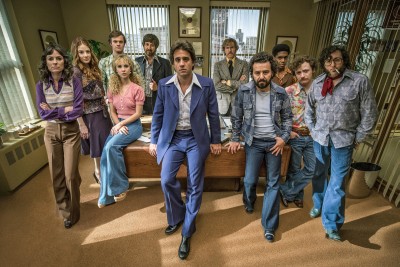
The late 1970s were one of the most pivotal eras in music history. Perhaps best known for its glitzy pop and disco music, it was also the era that music saw massive diversification with the rise of genres such as hip-hop and punk rock.
This creatively explosive time period is what HBO’s new show “Vinyl” explores. The show is produced by Mick Jagger and Martin Scorsese, the latter of whom also directed the two-hour-long pilot episode. With legends of both the film and music industries coming together to make an explorative television experience, “Vinyl” should have a lot going for it.
Unfortunately, that did not stand true.
The show stars Bobby Cannavale as Richie Finestra, a self-made record executive with a good heart and some bad habits. Cannavale successfully plays into the role of an initially unlikable and abrasive businessman. Yet through a combination of writing and performance, Richie becomes a sympathetic character.
He is the only suit in the room that genuinely cares about the music his company sells. It is this contrast of cold, corporate interest and artistic passion that makes the concept behind a show like “Vinyl” so compelling on paper and yet, in practice, only half of that equation is interesting.
The business side of events in “Vinyl” is comparatively dull when juxtaposed with the electric tale of musical discovery Richie embarks on. His struggling company, American Century, is in the midst of being bought out by a German company named Polygram. Richie is using an impending distribution agreement with Led Zeppelin as a selling point, however that agreement is not so definitive.
The resulting drama surrounding this buyout and the Zeppelin deal drags down the rest of the story that deals with various musical scenes in New York City.
“Vinyl” is at its best when its story is focused on musical exploration. The pilot episode opens with Richie walking into a club and discovering a rock band that is, quite literally, tearing down the house. There are also numerous other flashback scenes that involve Richie discovering blues and hip-hop artists, all of which are filmed in beautifully stylistic ways.
Scorsese depicts these different genres very distinctly from one another, giving each one its own visual identity to match its pre-existing auditory one. The hip-hop feels energetic and real, the blues are flashy yet subdued and the rock ‘n’ roll is chaotic and overwhelming.
However, “Vinyl” doesn’t use excellent music as a crutch to make itself interesting.
Cannavale’s performance makes these musically induced scenes of catharsis very rewarding and relatable. His journey of discovery is one filled with awe and wonder at the emotional power that music has. His sheer enthusiasm, as a result, is extremely contagious. “Vinyl” also wants to prove, however, that these very emotions reflected in music are not always positive.
Richie is a character dealing with multiple addictions. Cocaine and alcohol constantly act as temptations for Richie, and he is always in jeopardy of going off the deep end. The music he loves is often about losing control, and he is in no short supply of the substances in question. Naturally, he is constantly at odds with himself but also seems to be tied down by his family at home.
Richie’s wife Devon Finestra (Olivia Wilde) is his rock in many ways. It is clear that they both care about each other and, thankfully, there is no forced dramatic infidelity (not yet, at least). When Richie’s addiction gets the better of him, Devon is quick to criticize his behavior.
She firmly stands her ground against his actions, but it is clearly from of a place of love. Wilde expertly plays the loving wife, driven to tears of disappointment in her husband’s actions. The chemistry between Wilde and Cannavale is immediately engrossing, creating the sense that this is a deeply intricate relationship.
In terms of Scorsese’s filmography, “Vinyl” shares elements with “The Wolf of Wall Street” and “Goodfellas.” The lavish and crudely irresponsible lifestyles of these record executives are very reminiscent of “Wolf,” albeit without much of the satire that made that film interesting.
Meanwhile, a plotline revolving around a murder, as well as some dealings with heavily accented businessmen, recalls many scenes from Scorsese’s classic mob film. He draws on these past experiences and uses them as a jumping-off point for something entirely new.
A lot of what “Vinyl” does is unique and daring, but it doesn’t always work to its advantage. The pilot episode questionably used some surreal transitions that either felt cheesy or nonsensical. Some of the editing decisions are quite jarring and, while they may be stylistic, ultimately detract from the show as a whole.
As is usually the case with pilot episodes, “Vinyl” does a lot of setup for what will ultimately unfold later on. While that makes it difficult to judge the show with any sense of finality, it has set itself up for future success under Scorsese’s guidance. If it can focus more on music and less on business, “Vinyl” will become another jewel in the HBO crown.
“Vinyl” premieres Feb. 14 at 9 p.m. on HBO.




















































































































Alex Pena • Feb 12, 2016 at 10:04 am
As an intern that worked on the set of this movie and along with the editing department I have to say this review is a little off base. As you know with any of Mr. Scorsese’s movies that the music he uses in the story are perfect, he doesn’t always go for the popular song everyone knows he a lot of times uses songs you never heard before. I think this reviewer is falling into that trap, he is an uneducated music listener and that hurts this review.